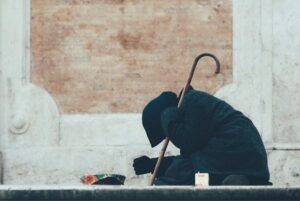I overheard a conversation by several members at an exclusive country club where I help out on Fridays as a Starter. I love being outside and enjoying God’s creation even from a golf cart on the first tee. It’s a beautiful location and a nationally ranked course. But….. I consistently hear about first-world problems.
Complaints, or suggestions for improvement, are not uncommon. For example, about staff members, other golfers, the proverbial stock market trends or insanely like today, about someone’s shirt being untucked – which is against the rules. Another member was particularly distracted by kids acting up in the dining room. Once again, first-world problems being experienced by people with means.
Garnering and harboring wealth are activities I know all too well. But recently something striking has been gnawing at my psyche. The unfathomable amount of money resident not only in this country but around the world contrasting the huge disparity between those with and those without. It’s disturbing yet not easily remedied.
God has a lot to say about finances in his Word. In fact, money and possessions are the second most referenced topic in the Bible – money being mentioned more than 800 times. How we treat the poor, how we manage our finances, and our accountability in doing so in this life is paramount.
The members of this Country Club are some of the wealthiest in our county. They live in homes that line the fairways and are worth countless millions. They spend tens of thousands of dollars every year at the club alone. I get it, I was one of those people. This is not meant to disparage the rich and their choices. It was impressive for me to drive big cars, build oceanfront homes, play on the finest golf courses, stay in elegant hotels, dine in the most prestigious restaurants, and travel the world. But I still had this empty feeling inside. I was chasing some unattainable dream.
Wealth is one thing, contentment and joy are another. I had one without the other and know many wealthy people that are broken and still searching for meaning and contentment. I hear their stories most Fridays.
Lifestyles of the Rich and Famous
I was watching a television show that profiles some of the most exclusive estates in the world. A $45 million waterfront property near Boca Raton, Florida had to be one of the most elegant that I have seen, with 350 feet of waterfront. Yet I scratch my head and say, wow, what might that money do for people in need? Or how might it be used to further the Kingdom of God? Really good questions, without easy answers.
I also understand that God gets to do what he wants to do. And we all have free will to steward money as we choose. But – if I could wave a magic wand, I would shift the priorities of those with financial influence to be more about what the disciples showed us in the early church.
Let’s pause for a moment. I’m not a socialist by any means. As a career business guy, I believe in capitalism and free markets. But I also believe we have a responsibility as Christians to take care of the poor and to do what God calls us to do at the moment He calls us. That looks different for each of us. On the other hand, if it were up to me I would, in my own flesh, distribute those funds unfairly. But that doesn’t stop me from experiencing this sinking feeling as I observe the disparity that exists in this world between those most in need and those ablest to help fill it.
Way Back
Nicky Gumbel tells a story that took place a couple of hundred years after Jesus ascended to Heaven.
Laurence was in charge of the finances of the church. He was also a deacon. There was a great revival taking place all around him. It was said that, ‘All of Rome were becoming Christians.’
As a result, persecution broke out under the Emperor Valerian in around the year AD 250. Christians who owned property distributed all the church’s money and treasures to the city’s poor.
Valerian ordered all bishops, priests and deacons to be arrested and executed. He offered Laurence a way out if he would show where all the church’s treasures were located.
Laurence asked for three days to gather it into one central place. He brought together the blind, poor, disabled, sick, elderly, widows and orphans. When Valerian arrived, Laurence flung open the doors and said, ‘These are the treasures of the church!’
Valerian was so angry that he decided beheading was not terrifying enough for Laurence. He ordered that this courageous man be roasted on a gridiron. That is how Laurence died on 10 August AD 258. Apparently, he even joked with his executioners, ‘You may turn me over. I’m done on this side.’ His courage made such an impression that the revival in Rome only increased, with many people becoming Christians including several senators who witnessed his execution.
St Laurence had a profound understanding of the message of Jesus. He understood that the poor are the true *treasures of the church*.
What should our attitude be to the poor? What about the rich? Is poverty a blessing or a curse? Are riches a blessing or a curse? Does the gospel promise prosperity? Of course not.
I’ve been long infatuated by the concept of a reverse tithe. Giving away 90% of what I earn provided the 10% can cover what’s needed to survive. I’m not at that place in my life, but I would love to get there. What a difference it would make if those with the wherewithal to do so took even 20% of their earnings and gave it away to a cause or causes that are vital to people’s existence here on this planet or more importantly vital to the Kingdom of God and others salvation. Here’s the sad truth though, on average Americans give away 2.1% of their disposable income to charity. Another interesting stat – the growth in giving is driven mostly by larger donations from fewer people. In 2015, about 1% of households accounted for almost half of the total donations. Make of that what you will.
Money Isn’t Everything
The book of Proverbs has a remarkably balanced understanding of wealth and poverty. Neither is seen as wholly good or wholly bad. They are understood as part of the wider fabric of life, and we are encouraged to use what we have wisely.
Proverbs 19 tells us. ‘Houses and wealth are inherited from parents, but a prudent wife is from the Lord’ (v.14). There is nothing wrong with houses or wealth; but there are more important things in life. Finding the right marriage partner is far more important than having lots of money.
For those tempted to work too hard in pursuit of money or any other goal, it is important to remember the sovereignty of God: ‘Many are the plans in a human heart, but it is the Lord’s purpose that prevails’ (v.21). Taking ‘Sabbath rest’ and holidays is a sign that you trust in God’s sovereignty.
Wealth is not the most important thing in life; nor is poverty the worst thing that can happen to you: ‘What a person desires is unfailing love; better to be poor than a liar’ (v.22). We need love far more than we need riches. Integrity of character is far more important than money.
On the other hand, this passage does not exalt poverty as a virtue. Sometimes poverty can be self-inflicted: ‘Laziness brings on deep sleep, and the shiftless go hungry’ (v.15).
Whatever the reason may be for a person’s poverty, be kind to the poor: ‘Those who are kind to the poor lend to the Lord, and he will reward them for what they have done’ (v.17).
This is an extraordinary and wonderful promise. God is no person’s debtor. Every time you do something kind for a poor person, you are lending to the Lord and he will repay with interest. Often, we see amazing blessings in the lives of those who spend their time ministering with the poor, the homeless and the prisoners. I am so blessed to work with both of these populations in our ministry at Embracing Brokenness. Teaching those willing to consider a better way is a privilege I don’t take lightly.
Poverty of the Apostles
On the outside, people were rich, honored and strong; but the church in Corinth was in a real mess. Paul points out that they were arrogant, proud and jealous. They tolerated sexual immorality, and they went to court against each other.
The apostle Paul starts to tackle some of these issues in his first letter to the church in Corinth. He sees in their lives the arrogance of the rich. They are proud of their material wealth. Paul explains in a nutshell why no one has any cause for pride: ‘Isn’t everything you have and everything you are sheer gifts from God? So what’s the point of all this comparing and competing? You already have all you need. You already have more access to God than you can handle’ (vv.7b–8, MSG).
They are rich like kings: ‘Already you have all you want! Already you have become rich! You have begun to reign – and that without us!’ (v.8a). There is a hint of sarcasm here. They are not really rulers at all, ‘How I wish that you really had begun to reign so that we might come to rule with you!’ (v.8b).
He contrasts their material wealth with the poverty of himself and of the other apostles. ‘You might be sure of yourselves, but we live in the midst of frailties and uncertainties. You might be well-thought-of by others, but we’re mostly kicked around. Much of the time we don’t have enough to eat, we wear patched and threadbare clothes, we get doors slammed in our faces, and we pick up odd jobs anywhere we can to eke out a living’ (vv.10–12, MSG).
Paul was one of the most influential Christians ever. His ministry was possibly the most ‘successful’ of all time. However, it did not lead to material prosperity. Quite the opposite. He was materially poor. He did not have enough food. He did not have nice clothes. He was homeless.
His poverty did not come about as a result of laziness: ‘We work hard with our own hands’ (v.12a). But, like many poor people today, he was subject to abuse. He did not respond in kind: ‘When we are cursed, we bless; when we are persecuted, we endure it; when we are slandered, we answer kindly. Up to this moment we have become the scum of the earth, the refuse of the world’ (vv.12b–13).
Paul writes with great love – not to shame them but to warn them. He sees them as a father sees his own children: ‘I’m writing as a father to you, my children. I love you and want you to grow up well, not spoiled. There are a lot of people around who can’t wait to tell you what you’ve done wrong, but there aren’t many fathers willing to take the time and effort to help you grow up’ (vv.14–15, MSG).
Paul’s heart was like that of a good father. A father’s heart is gentle, kind, nurturing, training, persevering and never gives up on people.
Riches of Kings
When Paul wrote, ‘Already you have become rich! You have begun to reign’ (1 Corinthians 4:8), perhaps he had kings like King David in mind.
David was rich. He had great ‘treasuries’ (1 Chronicles 26:22), he had ‘royal storehouses’ (27:25), he had ‘vineyards’, ‘wine vats’ (v.27), ‘olive and sycamore-fig trees’ (v.28), ‘supplies of olive oil’ (v.28b), ‘herds’ (v.29), ‘camels’ and ‘donkeys’ (v.30b), ‘flocks’ and ‘property’ (v.31).
Finances are not ‘unspiritual’. For example, the worship of God usually takes place in buildings. Buildings cost money. Running the financial side of a church is an important role. The ‘Levites were put in charge of the financial affairs of The Temple… They supervised the finances of the sanctuary of God’ (26:20,22, MSG). Shubael was ‘the chief financial officer’ (v.24, MSG).
Material wealth was often seen in the Old Testament as a sign of God’s blessing. It is still true that godly character – hard work, reliability, integrity and honesty – are characteristics that often can lead to success and material prosperity. However, as we have seen in the New Testament earlier, this is not the whole picture.[i]
Over the years I have come across a number of very rich Christians. Some of them are among the godliest and most committed believers I have known. Their riches are not necessarily a sign of God’s blessing – but neither are they something bad. The key thing is how you see your money, and what you do with it.
I challenge you, as I do myself, to seek first the Kingdom of God and all His righteousness. All these things, mostly blessings, will be added to you as the Bible tells us. The poor will always be among us, but we can do much to offset the hardships of those without the means to take care of their simplest needs. Ask God how you can help bring hope to the hopeless.
Wealth can be defined in several ways. Giving of ourselves is as precious to many as giving of our finances. You get to choose and be that blessing.
[i] Nicky Gumbel, Excerpts from the You Version Plan Bible in One Year






